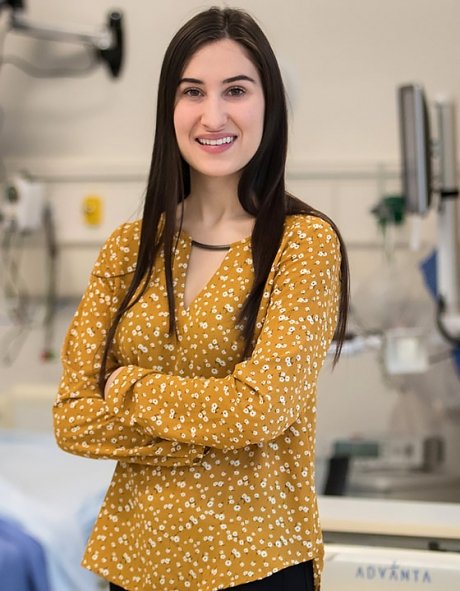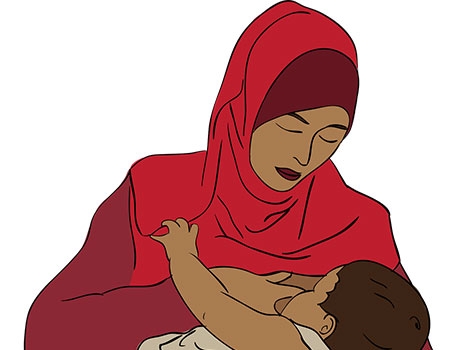Filling the Gap in Breastfeeding Education
- News & Events
- News
- Filling the Gap in Breastfeeding Education

This student saw a new mom struggling to breastfeed and took the issue on as an honor's research project.
While engaged in her nursing clinicals at Women and Infants Hospital, Alison Meola remembers helplessly looking on while an anxious new mother struggled with breastfeeding.
Though her nursing courses at the School of Nursing at Rhode Island College had prepared her for many of the tasks she had assumed in the maternity unit of the hospital, she hadn't been trained in how to breastfeed.
"The new mom's nurse was busy with other patients and there were only two lactation consultants for the entire hospital," she said. "During the eight hours I was there, there was no one to help this mom."

This experience impelled Meola to propose an honors research project on breastfeeding education.
"I didn't want another student to ever have to be in the same situation I had been in," she said.
“A mother's decision to breastfeed is one of the most important decisions she will make physiologically for her child," said Meola.
Yet "insufficient breastfeeding training in undergraduate nursing programs had left many future nurses unable to effectively assist mothers," she said.
With nurse midwife and Assistant Professor of Nursing Deborah Kutenplon as co-researcher on her project, Meola applied for the Anne & Bob DeStefano Undergraduate Research Scholarship to purchase equipment for a three-hour training for all students enrolled in Nursing 344: Maternal Newborn Nursing.
Meola's goal was to make the training a standard practice on the first day of nursing clinicals. That way students would have this knowledge before they actually saw patients.
The training she led involved five Skills Stations. Students learned how to hold a baby; how to extract breastmilk manually; how to know when the baby has a deep latch onto the breast; the five most common struggles mothers have with breastfeeding; and frequently asked questions, ranging from the benefits of breastfeeding to how to store breast milk.

The students then practiced their newfound skills in a simulation in which an actress, wearing the breast simulator and cradling the baby mannequin, re-enacted a mother in distress.
To assess their knowledge and confidence in teaching breastfeeding, Meola administered a pre-survey and post-survey. Sixteen weeks after the training, she tested the students again to find out how much information they had retained. They had a 74 percent retention rate.
"Alison is a bright, self-motivated student who identified a clinical need and developed a practical, evidence-based training to address it," said her mentor Kutenplon. "The training was so outstanding that RIC Maternal Newborn Nursing faculty will continue to use it after Alison graduates, equipping RIC students and future nurses with the knowledge and skills to promote successful breastfeeding." In addition, the breast simulator, infant manniquin and other equipment she purchased for the training, using funds from her research scholarship, will remain in the School of Nursing's simulation lab for use by future students.
Meola also designed an illustrated pocket guide for her students to reinforce their knowledge. "I encouraged them to share the booklet with new mothers as they teach mothers how to breastfeed," she said.
Currently, she is writing a research paper, edited by Kutenplon, which the two hope to publish. Meola is also a peer tutor in the nursing program. She said, "Between tutoring and designing this project I discovered a passion for nursing education, and through my clinicals at Women and Infants Hospital I discovered a love of maternal nursing. Seeing a mother give birth to her baby, seeing her hold her baby for the first time, seeing that look of happiness on her face, there's nothing like it," she said. Like her mentor, Meola intends to become a nurse midwife.
Anne & Bob DeStefano Undergraduate Research Scholarship
All Rhode Island College undergraduates may apply. Eligibility requirements are:
- Students must be enrolled as a full-time undergraduate student in any academic major or program at the college.
- Complete at least 45 credit hours at the time of application, with an overall GPA of at least 3.0
- The award must be used to support a senior project that has been approved by the student's department or program.
- And the application for funding must be approved by the faculty member who is directing the student's honors project.
